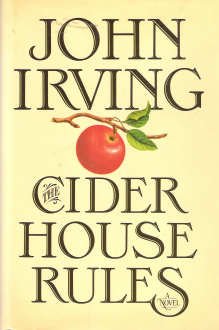The Cider House Rules
This article has multiple issues. Please help or discuss these issues on the talk page. (Learn how and when to remove these template messages)
|
 First edition cover | |
| Author | John Irving |
|---|---|
| Country | United States |
| Language | English |
| Genre | Bildungsromane |
| Publisher | William Morrow |
Publication date | June 1985 |
| Media type | Print (Hardcover) |
| Pages | 560 |
| ISBN | 0-688-03036-X |
| OCLC | 1003368413 |
| 813/.54 | |
| LC Class | PS3559.R8 C5 1985 |
| Preceded by | The Hotel New Hampshire |
| Followed by | A Prayer for Owen Meany |
The Cider House Rules (1985) is a novel by American writer John Irving, a Bildungsroman, which was later adapted into a film (1999) and a stage play by Peter Parnell. The story, set in the pre– and post–World War II era, is about a young man, Homer Wells, growing up under the guidance of Dr. Wilbur Larch, an obstetrician and abortionist. The story relates his early life at Larch's orphanage in Maine and follows Homer as he eventually leaves the nest and comes of age in the world.
Background[]
The story about Wally being shot down over Burma was based in part on that of Irving's biological father (whom he never met), who had been shot down over Burma and survived.[1]
Plot[]
Homer Wells grows up in an orphanage where he spends his childhood trying to be "of use" as a medical assistant to the director, Dr. Wilbur Larch, whose history is told in flashbacks: After a traumatic misadventure with a prostitute as a young man, Wilbur turns his back on sex and love, choosing instead to help women with unwanted pregnancies give birth and then keeping the babies in an orphanage. He makes a point of maintaining an emotional distance from the orphans, so that they can more easily make the transition into an adoptive family, but when it becomes clear that Homer is going to spend his entire childhood at the orphanage, Wilbur trains the orphan as an obstetrician and then comes to love him like a son.
Wilbur's and Homer's lives are complicated by Wilbur also secretly being an abortionist. Wilbur came to this work reluctantly, but he is driven by having seen the horrors of back-alley operations. Homer, upon learning Wilbur's secret, considers it morally wrong.
As a young man, Homer befriends a young couple, Candy Kendall and Wally Worthington, who come to St. Cloud's for an abortion. Homer leaves the orphanage, and returns with them to Ocean View Orchards (Wally's family's orchard) in Heart's Rock, near the Maine coast. Wally and Homer become best friends and Homer develops a secret love for Candy. Wally goes off to serve in the Second World War and his plane is shot down over Burma. He is presumed missing by the military, but Homer and Candy both believe he is dead and move on with their lives, which includes beginning a romantic relationship. When Candy becomes pregnant, they go back to St. Cloud's Orphanage, where their son is born and named Angel.
Subsequently, Wally is found in Burma and returns home, paralyzed from the waist down. He is still able to have sexual intercourse but is sterile due to an infection caught in Burma. They lie to the family about Angel's parentage, claiming that Homer decided to adopt him. Wally and Candy marry shortly afterward, but Candy and Homer maintain a secret affair that lasts some 15 years.
Many years later, teenaged Angel falls in love with Rose. Rose, the daughter of the head migrant worker at the apple orchard, becomes pregnant by her father, and Homer performs an abortion on her. Homer decides to return to the orphanage after the death of Wilbur, to work as the new director. Though he maintains his distaste for abortions, he continues Dr. Larch's legacy of honoring the choice of his patients, and he dreams of the day when abortions are free, legal, and safe, so he'll no longer feel obliged to offer them.
The name "The Cider House Rules" refers to the list of rules that the migrant workers are supposed to follow at the Ocean View Orchards. However, none of them can read, and they are completely unaware of the rules - which have been posted for years.
A subplot follows the character Melony, who grew up alongside Homer in the orphanage. She was Homer's first girlfriend in a relationship of circumstances. After Homer leaves the orphanage, so does she in an effort to find him. She eventually becomes an electrician and takes a female lover, Lorna. Melony is an extremely stoic woman, who refuses to press charges against a man who brutally broke her nose and arm so that she can later take revenge herself. She is the catalyst that transforms Homer from his comfortable but not entirely admirable position at the apple orchard to becoming Dr. Larch's replacement at the orphanage.
Film adaptation[]
The novel was adapted into a film of the same name released in 1999 directed by Lasse Hallström and starring Tobey Maguire as Homer Wells.
References[]
- ^ Mel Gussow (1998-04-28). "A Novelist Builds Out From Fact To Reach The Truth; John Irving Begins With His Memories". The New York Times. Retrieved 2009-11-07.
- 1985 American novels
- Novels by John Irving
- Novels about abortion
- American novels adapted into films
- Novels set in Maine
- William Morrow and Company books
- Novels about orphans